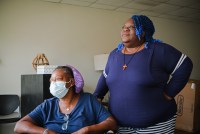Latest KFF Health News Stories
¿Comprando seguro de salud de ACA? Aquí, lo nuevo de este año
Comprar ahora significa tener cobertura vigente a partir del 1o de enero de 2023. Aunque gran parte de los planes permanecen iguales año tras año , hay algunos cambios que los consumidores deben tener en cuenta.
Shopping for ACA Health Insurance? Here’s What’s New This Year
Consumers may find relief in some key changes made by Congress and the Biden administration, although other issues remain unsettled.
KHN’s ‘What the Health?’: Finally Fixing the ‘Family Glitch’
The Biden administration has decided to try to fix the so-called “family glitch” in the Affordable Care Act without an act of Congress. The provision has prevented workers’ families from getting subsidized coverage if an employer offer is unaffordable. Meanwhile, Medicare’s open enrollment period begins Oct. 15, and private Medicare Advantage plans are poised to cover more than half of Medicare’s 65 million enrollees. Margot Sanger-Katz of The New York Times, Joanne Kenen of the Johns Hopkins Bloomberg School of Public Health and Politico, and Rachel Cohrs of Stat join KHN’s Julie Rovner to discuss these topics and more. Plus, for extra credit, the panelists recommend their favorite health policy stories of the week they think you should read.
Journalists Dig In on the Fiscal Health of the Nation and Hospital Closures in Rural Missouri
KHN and California Healthline staff made the rounds on national and local media this week to discuss their stories. Here’s a collection of their appearances.
Is Covid ‘Under Control’ in the US? Experts Say Yes
PolitiFact has been tracking this campaign promise since 2020. Experts are now saying it’s fair to describe the covid pandemic as “under control.”
Journalists Dissect Medical Coding and Parse the President’s Words
KHN and California Healthline staff made the rounds on national and local media this week to discuss their stories. Here’s a collection of their appearances.
KHN’s ‘What the Health?’: Biden Declares the Pandemic ‘Over’
President Joe Biden, in an interview with CBS’ “60 Minutes,” declared the covid-19 pandemic “over,” stoking confusion for members of his administration trying to persuade Congress to provide more funding to fight the virus and the public to get the latest boosters. Meanwhile, concerns about a return of medical inflation is helping boost insurance premiums even as private companies race to get their piece of the health pie. Anna Edney of Bloomberg News, Joanne Kenen of the Johns Hopkins Bloomberg School of Public Health and Politico, and Lauren Weber of KHN join KHN’s Julie Rovner to discuss these issues and more. Also, for extra credit, the panelists suggest their favorite health policy stories they think you should read, too.
Many Refugees Dealing With Trauma Face Obstacles to Mental Health Care
Refugees are arriving in the U.S. in greater numbers after a 40-year low, prompting some health professionals to rethink ways to provide culturally competent care amid a shortage of mental health services.
A Disability Program Promised to Lift People From Poverty. Instead, It Left Many Homeless.
A federal disability program meant to provide basic income for people unable to work has left many of its recipients homeless. Advocates for the poor say the crisis is growing worse as rents rise and Congress decides whether to make changes to the program that would affect millions of people.
At 988 Call Centers, Crisis Counselors Offer Empathy — And Juggle Limited Resources
During a mental health crisis, a conversation with an empathetic listener can be lifesaving. But for in-person help, resources are in short supply in many parts of the country.
En centros de llamadas del 988 se lucha contra el suicidio… y la falta de recursos
Para las personas que sufren una crisis de salud mental, llamar al 988 puede ser una decisión que les salve la vida. Pero lo que ocurra después de la llamada depende de en donde vivan.
Journalists Dig Into Questions About the 988 Hotline and Inflation Reduction Act
KHN and California Healthline staff made the rounds on national and local media this week to discuss their stories. Here’s a collection of their appearances.
KHN’s ‘What the Health?’: Wrapping Up Summer’s Health News
President Joe Biden has signed the Inflation Reduction Act and Congress is gone until after Labor Day. But the administration and lawmakers left lots of health policy achievements behind, including new rules to facilitate the sale of over-the-counter hearing aids and a potential reorganization of the Centers for Disease Control and Prevention. Anna Edney of Bloomberg News, Alice Miranda Ollstein of Politico, and Joanne Kenen of the Johns Hopkins Bloomberg School of Public Health and Politico join KHN’s Julie Rovner to discuss these issues and more. Also, for extra credit, the panelists suggest their favorite health policy stories of the week they think you should read, too.
La salud de los inmigrantes se quiebra, y empeora, mientras esperan en refugios fronterizos
La espera, que puede durar meses, hace que algunos migrantes desarrollen problemas de salud. Han aumentado las dolencias crónicas, como la hipertensión o la diabetes.
Shelter Sickness: Migrants See Health Problems Linger and Worsen While Waiting at the Border
U.S. immigration policies, an increasing number of migrants, and the covid-19 pandemic have led to the growth of the Mexican shelter system, in which people are getting sick and medical care is limited.
Community Health Centers’ Big Profits Raise Questions About Federal Oversight
Nonprofit federally funded health centers are a linchpin in the nation’s health care safety net because they treat the medically underserved. The average profit margin is 5%, but some have recorded margins of 20% or more in three of the past four years.
Inflation Reduction Act Contains Important Cost-Saving Changes for Many Patients — Maybe for You
The legislation, which the House is expected to pass Friday, would allow the federal government, for the first time, to negotiate the price of some drugs that Medicare buys. It also would extend the enhanced subsidies for people who buy insurance on the Affordable Care Act marketplaces.
KHN’s ‘What the Health?’: A Big Week for Biden
Congress is leaving for its annual summer break having accomplished far more than many expected, including, barring unforeseen snags, a bill to address the cost of prescription drugs for Medicare beneficiaries and extend the enhanced subsidies for insurance premiums under the Affordable Care Act. Meanwhile, the abortion issue continues to roil the nation as Indiana becomes the first state to ban the procedure in almost all cases since the Supreme Court overruled the constitutional right to abortion in June. Alice Miranda Ollstein of Politico, Sarah Karlin-Smith of the Pink Sheet, and Rachel Cohrs of Stat join KHN’s Julie Rovner to discuss these issues and more.
No, the Senate-Passed Reconciliation Bill Won’t Strip $300 Billion From Medicare
Under the Medicare drug negotiations provisions in the reconciliation bill, the federal government would see its outlays reduced by about $300 billion. That reduction wouldn’t result from cuts in benefits. Instead, Medicare would be empowered to leverage its market power to pay lower prices for certain drugs.
Patients and Doctors Trapped in a Gray Zone When Abortion Laws and Emergency Care Mandate Conflict
Since the U.S. Supreme Court overturned Roe v. Wade in June, ER doctors say they — and their patients — are trapped between state anti-abortion laws and the federal law requiring that care be delivered in emergency situations. Women’s lives hang in the balance.


















